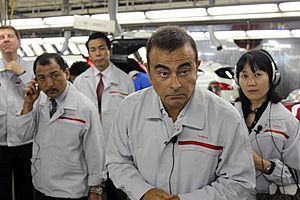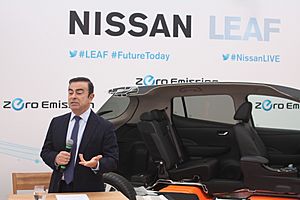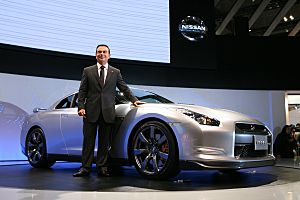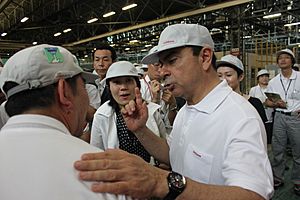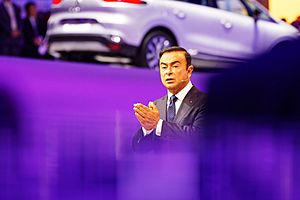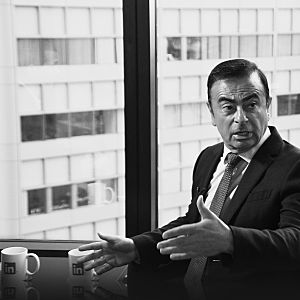Carlos Ghosn facts for kids
Quick facts for kids
Carlos Ghosn
|
|
|---|---|
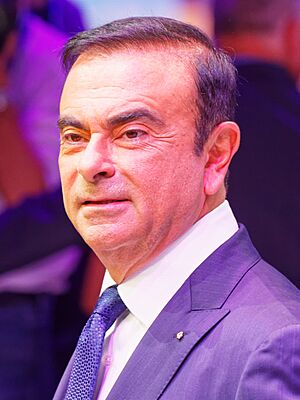
Ghosn in 2014
|
|
| Born | 9 March 1954 Porto Velho, Rondônia, Brazil
|
| Citizenship |
|
| Alma mater |
|
| Spouse(s) |
Rita Kordahi
(m. 1984; div. 2012)Carole Nahas
(m. 2016) |
| Children | 4, including Caroline |
Carlos Ghosn (born 9 March 1954) is a well-known businessman and former leader in the car industry. He held important positions at major companies like Michelin North America, Renault, AvtoVAZ, Nissan, and Mitsubishi Motors. He was known for his ability to help struggling companies become successful again.
Ghosn started his career in 1978 at Michelin, a large tire company in Europe. He worked there for 18 years, taking on many leadership roles, including managing operations in South America. In 1999, he moved to Japan to help Nissan, a Japanese car company that was facing difficulties. He became the chief operating officer and later the chief executive officer. Under his leadership, Nissan became profitable again and grew stronger around the world. In 2005, he also became the CEO of Renault, leading both companies at the same time. Later, in 2016, he became chairman of Mitsubishi Motors after Nissan bought a part of that company. He eventually left these roles in 2018 and 2019.
Contents
Early Life and Education Journey
Carlos Ghosn's family has roots in Lebanon and Brazil. His grandfather, Bichara Ghosn, moved from Lebanon to Brazil when he was young. He became a successful businessman in Brazil. Carlos's father, Jorge Ghosn, worked in the diamond and airline industries.
Carlos Ghosn was born on 9 March 1954, in Porto Velho, Brazil. When he was about two years old, he became ill. His mother then moved with him to Rio de Janeiro. In 1960, when Carlos was six, he, his mother, and his sister moved to Beirut, Lebanon, where other family members lived.
He finished his high school studies in Lebanon at the Jesuit school Collège Notre-Dame de Jamhour. He then went to Paris, France, for further studies. He earned engineering degrees from two famous schools: the École Polytechnique in 1974 and the École des Mines de Paris in 1978.
Building a Career in Business
Starting at Michelin
After graduating in 1978, Ghosn spent 18 years working at Michelin, a very large tire manufacturer in Europe. He trained and worked in different factories in France and Germany. In 1981, he became a plant manager in Le Puy-en-Velay, France. By 1984, he was leading research and development for the company's industrial tire division.
In 1985, at 30 years old, Ghosn was put in charge of Michelin's operations in South America. He moved back to Rio de Janeiro. His job was to improve the business, which was not making money and was struggling with high inflation in Brazil. Ghosn created teams with people from different departments and countries to find the best ways to work. This experience helped him develop a management style that valued different cultures and ideas. He believed that "You learn from diversity." The South American division became profitable within two years.
After successfully improving Michelin's South American business, Ghosn became the president and chief operating officer of Michelin North America in 1989. He moved to Greenville, South Carolina, with his family. In 1990, he was promoted to CEO of Michelin North America. He led the company through a big reorganization after it bought the Uniroyal Goodrich Tyre Company.
Joining Renault and Nissan
In 1996, Ghosn joined Renault, a French car company. He became an executive vice president, responsible for many areas like purchasing, research, and manufacturing. He also oversaw Renault's South American division. Ghosn's changes helped Renault become profitable in 1997. His success at Michelin was repeated at Renault.
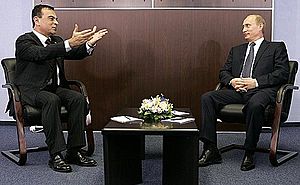
In March 1999, Renault and Nissan formed an alliance. Renault bought a large share of Nissan. Ghosn joined Nissan as its chief operating officer in June 1999. He became its president in June 2000 and chief executive officer in June 2001. When he joined, Nissan was in serious debt, and only a few of its car models were making money. Many thought it would be impossible to save the company.
Ghosn announced his "Nissan Revival Plan" in October 1999. He aimed for Nissan to be profitable by 2000, have a good profit margin by 2002, and cut its debt by half by 2002. He even promised to resign if these goals were not met. His plan involved cutting 21,000 jobs, mostly in Japan, closing five Japanese factories, and reducing the number of suppliers.
Ghosn was one of the first non-Japanese people to lead a Japanese car company. He made big changes to Nissan's structure and culture. He changed how promotions were given, moving away from seniority-based systems. He also changed Nissan's traditional business network, called keiretsu. He even made English the official company language.
In the first year of his plan, Nissan's profit jumped to $2.7 billion. Within three years, Nissan became one of the most profitable car makers. All the goals of the Nissan Revival Plan were met before March 31, 2002.
In May 2002, Ghosn announced new goals called "Nissan 180." This plan aimed to increase global sales by one million vehicles, achieve an operating profit margin of at least 8%, and eliminate debt by 2005. All these goals were also achieved. Nissan's debt was gone by 2003, and its profit margin reached 11.1% in 2003.
In May 2005, Ghosn became the president and CEO of Renault as well. This made him the first person in the world to lead two companies on the Fortune Global 500 list at the same time.
In 2007, Ghosn led the Renault–Nissan Alliance into the electric car market. He invested a lot of money into this effort. In 2008, he confirmed that Nissan–Renault would offer a full range of zero-emission electric cars by 2012. He believed that electric cars were the only way to allow more people to own cars without increasing pollution. The Nissan Leaf, an electric car, was launched in December 2010. By 2017, the Renault–Nissan Alliance was a world leader in electric vehicles.
Ghosn was also very active in helping Japan recover after the 2011 earthquake and tsunami. He visited affected factories and encouraged optimism. He made sure Nissan restored its operations quickly.
In June 2012, Ghosn became deputy chairman of the board of the Russian car manufacturer AvtoVAZ. In June 2013, he became its chairman. Renault had started a partnership with AvtoVAZ in 2008, and this led to the Renault–Nissan Alliance taking control of the Russian company in 2014.
In February 2017, Ghosn announced he would step down as CEO of Nissan on April 1, 2017, but would remain chairman. Hiroto Saikawa took over as CEO at Nissan.
Leading Mitsubishi Motors
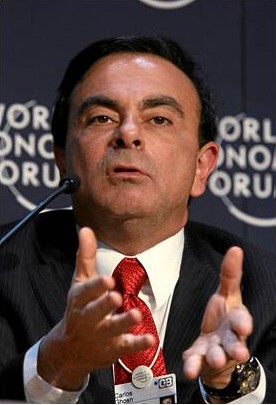
In October 2016, Nissan bought a controlling share in Mitsubishi Motors. Ghosn became the chairman of Mitsubishi, in addition to his roles at Renault and Nissan. His goal was to help Mitsubishi recover after a scandal involving fuel-economy information. The partnership between Nissan and Mitsubishi, along with Renault, created one of the world's largest car groups.
Mitsubishi Motors' board removed Ghosn from his role as chairman on November 26, 2018.
Personal Life and Interests
Carlos Ghosn was first married to Rita Kordahi, and they had four children: Caroline, Nadine, Maya, and Anthony. They divorced in 2012. In May 2016, Ghosn married Carole Nahas. They celebrated their wedding and Carole's 50th birthday at the Grand Trianon of the Palace of Versailles in France.
Ghosn is known for his hard work and direct approach in business meetings. He likes to solve problems by listening to employees and forming diverse teams. He holds citizenship in Lebanon, Brazil, and France. He is also multilingual, speaking Arabic, English, French, and Portuguese fluently, and has studied Japanese. He is a partner in Ixsir, a winery in Lebanon.
In the Media Spotlight
Starting in November 2001, Carlos Ghosn's life story was turned into a superhero comic book series in Japan, called The True Story of Carlos Ghosn. His face has even appeared on Lebanese postage stamps and Japanese bento boxes.
Ghosn is the subject of several books. He wrote a business book called Shift: Inside Nissan's Historic Revival. Other books about him include Turnaround: How Carlos Ghosn Rescued Nissan by David Magee, and The Ghosn Factor: 24 Inspiring Lessons From Carlos Ghosn, the Most Successful Transnational CEO by Miguel Rivas-Micoud.
Documentaries about his life have also been released. Netflix released Fugitive: The Curious Case of Carlos Ghosn in 2022. Apple TV+ released Wanted: The Escape of Carlos Ghosn in 2023.
Awards and Special Recognition
Carlos Ghosn has received many awards and honors for his achievements:
- In 2001, TIME magazine listed him among the top Global Influentials.
- In 2002, the French government made him a Chevalier of the Legion of Honour.
- In 2002, Fortune magazine named him Asia Businessman of the Year.
- In 2004, he received the prestigious Blue Ribbon Medal from Emperor Akihito of Japan, becoming the first foreign business leader to do so.
- In 2004, he was added to both the Automotive Hall of Fame and the Japan Automotive Hall of Fame.
- In 2006, he was made an Honorary Knight Commander of the Order of the British Empire.
- In 2010, CEO Quarterly magazine listed him as one of the "Most Respected CEOs."
- In 2011, CNBC named him Asia Business Leader of the Year.
- In 2012, he received the Grand Cordon of the Order of Ouissam Alaouite from Morocco.
- In 2012, he won a Lifetime Achievement Award from the Strategic Management Society.
- In 2012, he was awarded the Grand Cross of the Order of Isabella the Catholic from Spain.
- In 2017, Lebanon's national post office, LibanPost, released a collectible stamp honoring Carlos Ghosn.
See also
 In Spanish: Carlos Ghosn para niños
In Spanish: Carlos Ghosn para niños
 | Janet Taylor Pickett |
 | Synthia Saint James |
 | Howardena Pindell |
 | Faith Ringgold |


